2015
Disability and Sexuality Studies Working Group Meeting
Please join The Disability and Sexuality Studies working group for a screening of The Sessions and to discuss Carbon Fibre Masculinity by Anna Hickey-Moody (email ucbdss@gmail.com for PDF) and these photos (Warning: Partial nudity and images of weapons): https://www.distractify.com/wounded-veterans-1260936059.html?ts_pid=2
When: Wednesday October 14, 5:30pm
Where: Barrows 602 (GWS Cafe) *
Refreshments provided
*all events are scent-free
DSS events are open to all, please share widely.
About us
The Disability and Sexuality Studies working group provides a space for inquiry into both disability scholarship and activism. Through connecting readings with current events, screenings, performances, etc., the group explores the intersections of queer theory and disability studies. Sponsored by the Center for the Study of Sexual Culture. For more information contact co-coordinators, Gracen Brilmyer and Natalia Duong at ucbdss@gmail.com
Please email: ucbdss@gmail.com with any accessibility questions/needs/concerns
Non-Existent at 82° 30′ N 108° 22′ W: Mirages, Digital Maps, and the Historical Problem of Location
In this time of hyper-locatability via digital maps, what kinds of places and things might still remain lost? Dinshaw and Long look to the geo-physical phenomenon of the mirage to explore the broad concepts of location and locatability–and to imagine what might escape ever-present and increasingly monetized location services. The talk investigates the mirage’s visual and cultural history through a wide array of materials: medieval maps and legends, early 20th-century Arctic expeditions, and photographs and video from Long’s project on mirages. Dinshaw and Long take a long view of the mirage–an optical effect that prompts an irrational experience of time and space–in order finally to envision how to work and play with current digital mapping technologies intended to work us.
Marget Long is an artist living and working in New York. Her work engages the physical experience and sensory politics of photographic technologies, now and in the past. Her artist’s book, FLASH + CUBE (1965-1975) [punctum books, 2012], traces the sensory links between light, war, history, and photography through a forgotten piece of technology, the Sylvania flash cube. She lectures frequently on photography, new media, and visual culture. Her work has been screened and exhibited at venues including Anthology Film Archives, The Art Institute of Chicago, The Brooklyn Museum, British Film Institute, Exit Art, Kunsthaus Bregenz, and American Cinémathèque, and is currently on view in a solo exhibition at The Center for Land Use Interpretation.
Carolyn Dinshaw is Professor of Social and Cultural Analysis and English at New York University, where she founded the Center for the Study of Gender and Sexuality and served as its director from 1999-2005. She is the author of How Soon is Now? Medieval Texts, Amateur Readers, and the Queerness of Time (Duke UP, 2012); Getting Medieval: Sexualities and Communities, Pre- and Postmodern (Duke UP, 1999); and the first full-length feminist study of Chaucer, Chaucer’s Sexual Poetics (U of Wisconsin P, 1989). She is founding editor, with David M. Halperin, of GLQ: A Journal of Lesbian and Gay Studies (Duke UP). In the classroom, she regularly teaches materials past and present, in courses ranging from Medieval Misogyny to Queer New York City.
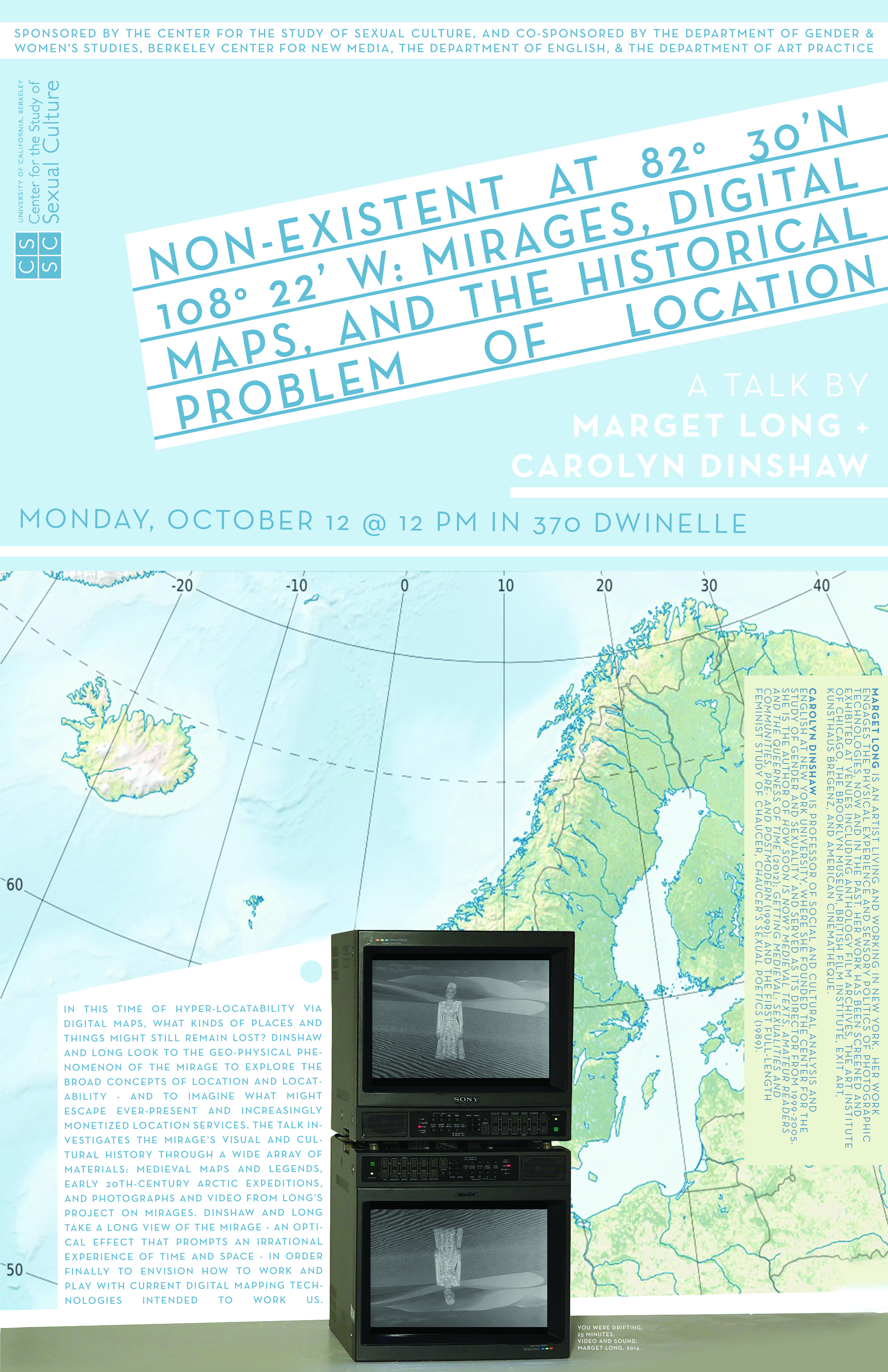
Sponsored by the Center for the Study of Sexual Culture, and co-sponsored by the Department of Art Practice, the Department of English, the Berkeley Center for New Media, and the Department of Gender & Women’s Studies.
Networked Boredom: On the Desire for Connection
This talk addresses the ordinariness of a basic fact of much contemporary life: the compulsory (if not compulsive), ubiquitous, and permanent availability of and on the network. My central case is a set of social practices practices in and around gay hookup or sex sites and apps, most especially Grindr. Taking a phenomenological approach and thinking with, by turns, film theory, media theory, affect theory, queer theory, and psychoanalytical object relations theory, I describe the common practices of “looking around” and waiting for messages from unspecified others. Grindr and its relatives are paradigmatic not only because they offer interfaces to the Internet as an infrastructural network, but also offer “connection” as an organizing metaphor for sexual (or polymorphously other) encounters between men. These networks specify genres of both the abstractness of boredom and the impersonality of desire—as enabling conditions for connection, but also as forms of mitigating the risk and exposure that are endemic to encounter and desire. Such risk management—anonymity, impersonality—is nothing new to gay or MSM sexual practices and cultures. The novelty here lies in the details: the technical interface and its design, the temporality of always-on availability, and the abstracted elsewhere-embodiment of the terminal. Grindr dramatizes that, increasingly, the impersonality of desire is yoked to the impersonality of technical protocol. Its abstracted and networked waiting-for-connection indexes a shift both in our capacity for aloneness and our capacity for being-with-others. The network engenders novel forms of boredom, in which our desire is organized not by anything in particular, but rather the network’s own metaphor for encountering, mere “connection.”
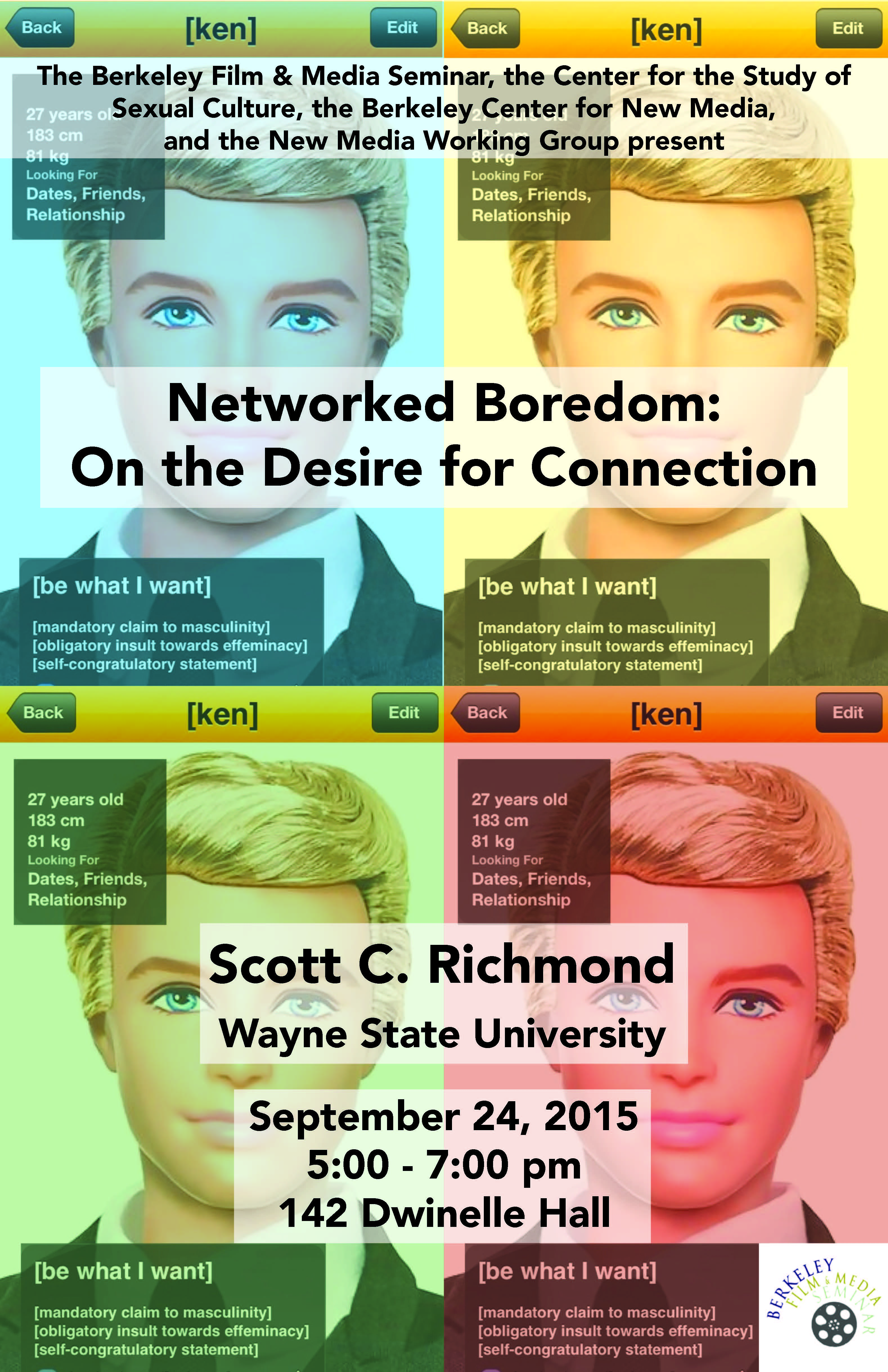
Queer of Color Working Group Meeting
Please join the Queer of Color Working Group as we begin the fall semester with light readings and refreshments. We’ll be at our usual spot in Barrows 602, so come introduce yourselves and help us plan for the year. Lastly, we’ll be discussing some work from the recent issue of Differences on the centrality of anti-normativity to queer studies, and whether or not it is running out of steam. So please, come out with us – we’re excited to be in your company again, and hope to see you soon!
For copies of the readings or to be added to the mailing list, please contact either brandon.callender@berkeley.edu or cornejo@berkeley.edu
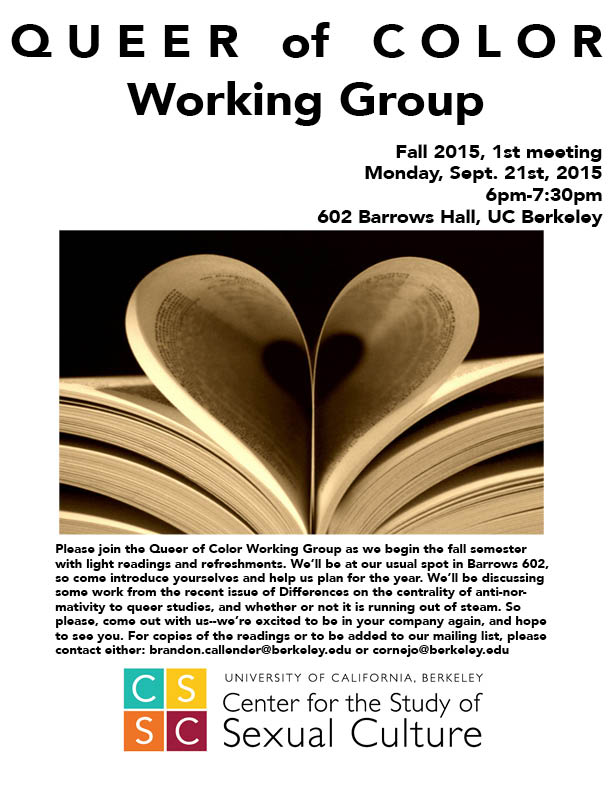
Disability & Sexuality Studies Working Group Meeting
Refreshments provided
All events are scent-free
About us
The Disability and Sexuality Studies working group provides a space for inquiry into both disability scholarship and activism. Through connecting readings with current events, screenings, performances, etc., the group explores the intersections of queer theory and disability studies. Sponsored by the Center for the Study of Sexual Culture. For more information contact co-coordinators, Gracen Brilmyer and Natalia Duong at ucbdss@gmail.com
Please email: ucbdss@gmail.com with any accessibility questions/needs/concerns
DSS events are open to all.
Sponsored by the UC Berkeley Center for the Study of Sexual Culture.
Disability and Sexuality Studies Working Group Meeting
In our May meeting we will be reading chapter 1 of Lauren Berant’s Cruel Optimism and we have an optional article from Petra Kuppers: Toward a Rhizomatic Model of Disability: Poetry, Performance, and Touch.
For PDFs of readings, please email: ucbdss@gmail.com
*all DSS meetings are scent-free
Queering Neural Citizenship: Lessons from Autism and Neurodiversity
Neural knowledge is transforming how we identify, understand, and manage personhood and citizenship vis-a-vis conceptions of “normal” and “abnormal” brains. Consequently, neural citizenship projects (like biological ones) describe how neural knowledge is increasingly used to identify, mark, and act upon individuals as part of populations. As an “abnormal” neurotype, autism dominates national imaginaries and debates while contestations over its meaning ripple and rage through social, political, and scientific networks proliferating and intensifying neurality. From vaccine resistance to neurodiversity, divergent responses to autism index the increasing presence and significance of neural citizenship. Warrior mothers and immunity moms manage neural citizenship of their children by seeking to rescue their children from the “threat” of autism or to avoid the threat altogether by resisting vaccines. Neurodiversity advocates challenge the barriers that limit the participation of autistics in society by arguing for belonging, legitimacy, and citizenship rights through self-advocacy, disability rights, and acceptance in place of rehabilitation, institutionalization, and normalization. Advocating that queer studies must engage with neurality and neural citizenship, this presentation considers what lessons can be drawn from queering autism and neurodiversity.
Jigna Desai is the chair of and Professor in the Department of Gender, Women, and Sexuality Studies and a founding member and former director of the Asian American Studies Program at the University of Minnesota. Her research interests include Asian American, postcolonial, queer, and feminist disability studies. Her book Beyond Bollywood: The Cultural Politics of South Asian Diasporic Film is the first book on the complex gender, sexual, and racial politics of South Asian diasporas (Routledge 2004). It is also critical to the formation of the global subfield of Bollywood Studies. She has co-edited several collections — Bollywood: A Reader (Open University /McGraw Hill Press, 2009), Transnational Feminism and Global Advocacy in South Asia (Routledge, 2012), and Asian Americans in Dixie: Race and Migration in the South (University of Illinois Press, 2013). She has published widely on issues of race, media, gender, and sexuality in journals such as Social Text, Journal of Asian American Studies, and Meridiens. She serves on editorial boards for several international journals and as a co-editor of the Asian American Experience book series for the Univ. of Illinois Press. She has taught over 15 different undergraduate and graduate at the Univ. of Minnesota as well held a visiting professorship at Harvard University. She has also been honored with the “Red Motley” Undergraduate Teaching Award, the Association for Asian American Studies Mentoring Award, Graduate Mentoring Award and a University of Minnesota Service Award. This work is part of a larger project on neural citizenship.
This event is free, open to the public, and wheelchair accessible. Please refrain from wearing scented products so that people with chemical sensitivities can participate. If you need any other disability accommodation in order to attend, including communication services, please contact Mel Y. Chen melychen@berkeley.edu
This event is co-sponsored by the Department of Gender & Women’s Studies and the Haas LGBTQ Citizenship Cluster.
Part of the CSSC’s 2014-15 Speaker Series.
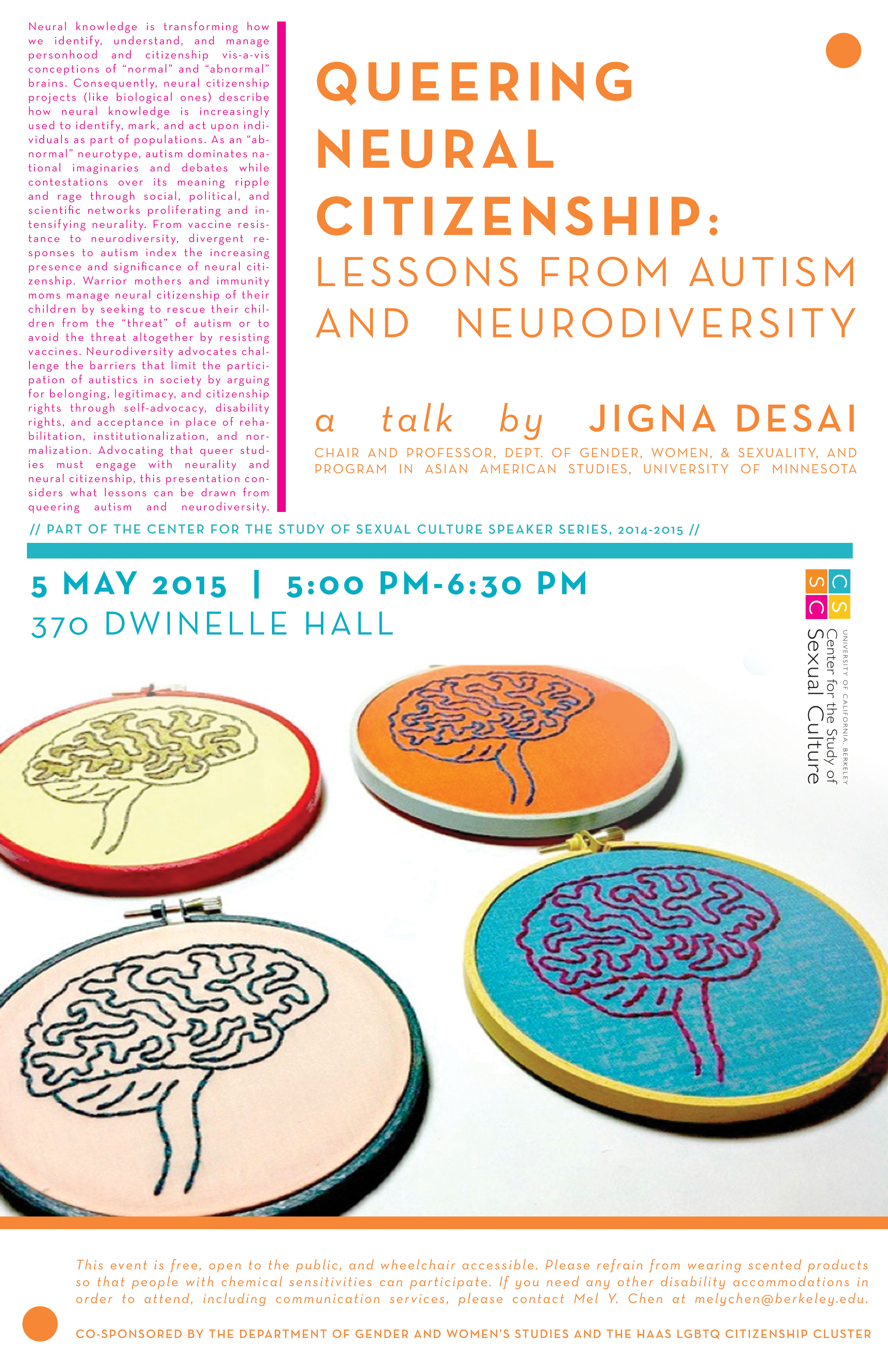
Disability and Sexuality Studies Working Group Meeting
We will be discussing the introduction and Chapters 1, 3, & 7 from Feminist, Queer, Crip by Alison Kafer (along with any other chapters you’d like to read). Axis Dance is having a performance on April 8th at SOMArts (San Francisco) that we are going to try to attend. More information and tickets can be found at: http://www.axisdance.org/season/
DSS events are open to all
All DSS meetings are scent-freeAbout us
The Disability and Sexuality Studies working group provides a space for inquiry into both disability scholarship and activism. Through connecting readings with current events, screenings, performances, etc., the group explores the intersections of queer theory and disability studies. Sponsored by the Center for the Study of Sexual Culture. For more information contact co-coordinators, Gracen Brilmyer and Natalia Duong at ucbdss@gmail.com
“Nothing is True, Everything is Permitted”: Indigenous Animus in the Age of Liberation
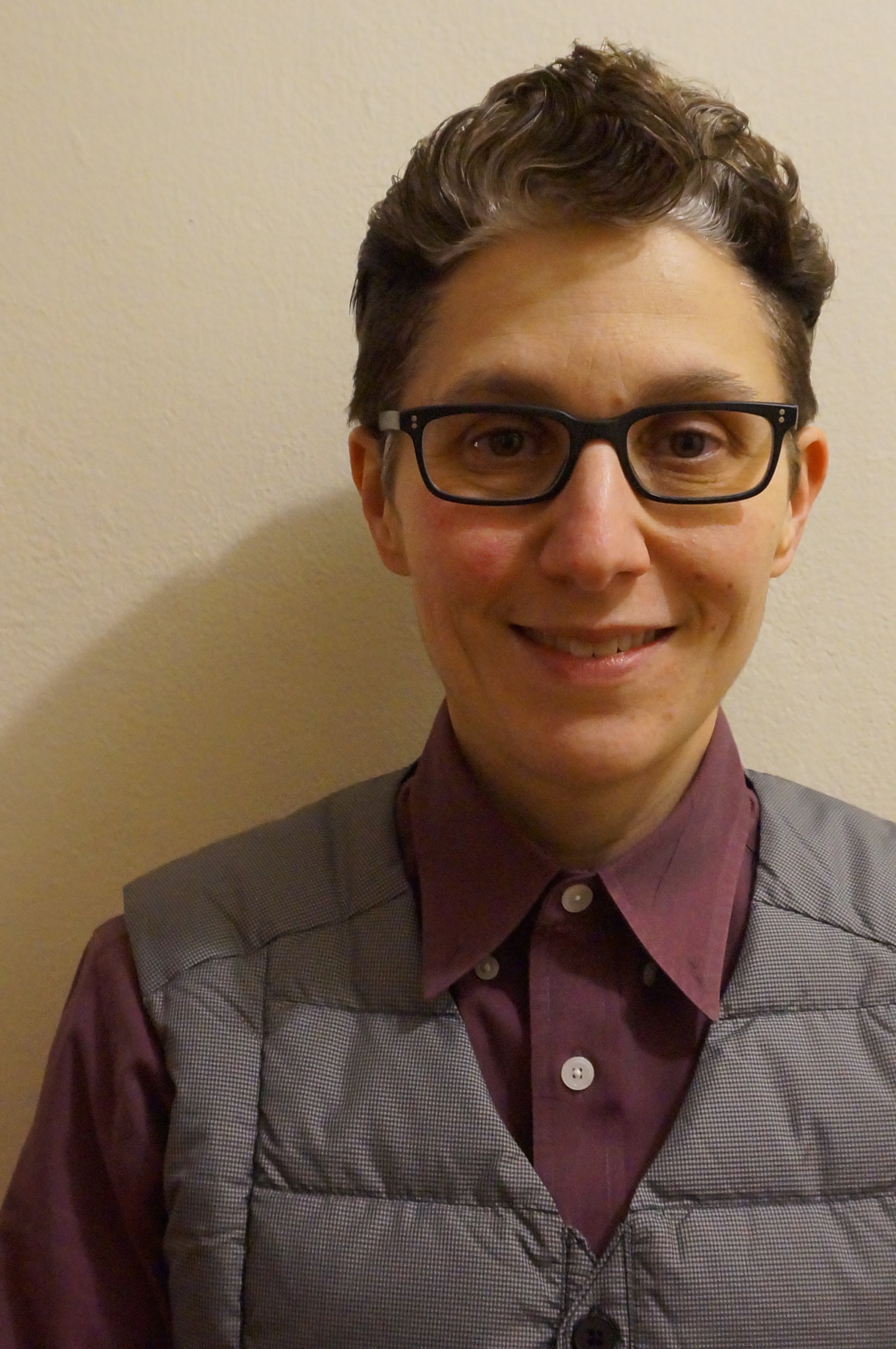 Close-reading Assassin’s Creed 3 and Assassin’s Creed: Liberation, this paper will consider how American Indian and Indigenous studies might intersect with videogame studies, especially at the sites of narrative, racial representations, and history. Examining how settler colonialism is reimagined through digital space, the paper will discuss how indigeneity might disrupt the historicities of code and play.
Close-reading Assassin’s Creed 3 and Assassin’s Creed: Liberation, this paper will consider how American Indian and Indigenous studies might intersect with videogame studies, especially at the sites of narrative, racial representations, and history. Examining how settler colonialism is reimagined through digital space, the paper will discuss how indigeneity might disrupt the historicities of code and play.
Jodi A. Byrd is a citizen of the Chickasaw Nation of Oklahoma and associate professor of American Indian Studies and English at the University of Illinois at Urbana-Champaign. Her articles have appeared in American Indian Quarterly, Cultural Studies Review, Interventions, J19, American Quarterly, and College Literature. She is the author of The Transit of Empire: Indigenous Critiques of Colonialism (University of Minnesota Press, 2011).
This event is co-sponsored by the Center for Race & Gender, the Department of Film & Media, the Department of Gender & Women’s Studies, and the Native American Studies Program.
Part of the CSSC’s 2014-15 Speaker Series.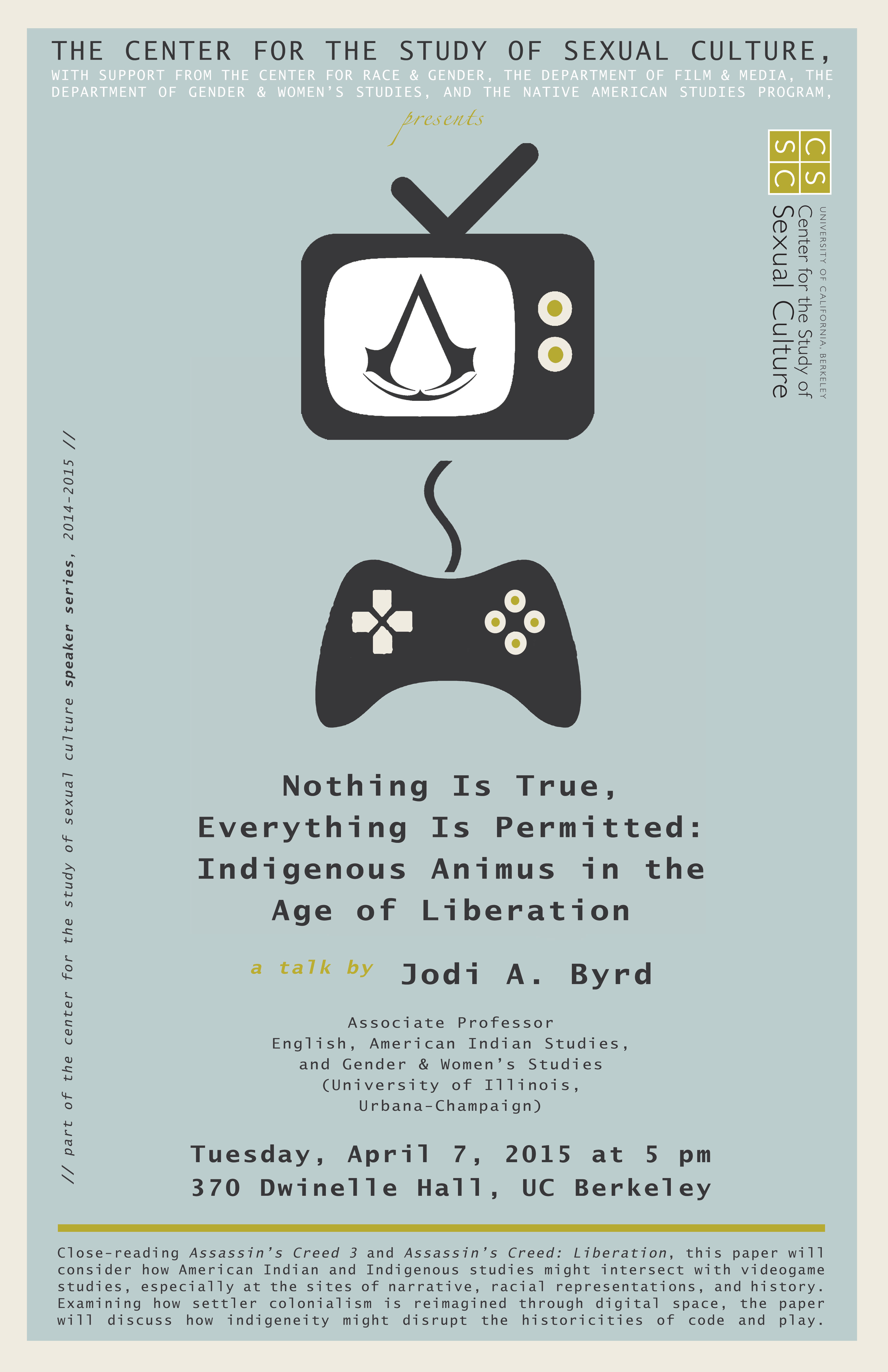
Disability & Sexuality Studies Working Group meeting
Please email ucbdss@gmail.com for readings.
For more information on the Disability Incarcerated Events please visit: http://diversity.berkeley.edu/disabilityincarcerated
DSS events are open to all.
Sponsored by the Center for the Study of Sexual Culture.
Vaginal Impressions: The Affective Biopolitics of the First Women Physicians
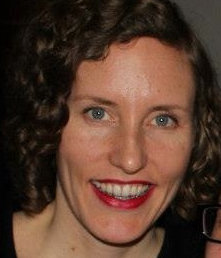 This talk proposes that the notion of the human nervous system as an impressible, malleable entity continuously remade by contact with its environment lies at the heart of nineteenth-century U.S. cultural politics. Theorizing “impressibility” as a nineteenth-century keyword linking race and sexuality, the talk explores how scientists, reformers, and writers alike saw themselves as working in concert with a neurobiological substrate that they conceived of as, in its ideal form, fluid, malleable, and forever in dynamic exchange with surrounding bodies, objects, and forces. I show how the modern formations of race and sexual difference consolidated in part as a discourse of the variegated capacity of neurological responsiveness. Before genetics, sensory contact between bodies and the differentially affective qualities of the human nervous system was understood to shape hereditary legacies. The talk’s investigation of the pre-determinist materiality of the body provides an important perspective on the biopolitics of affect and the stakes of feminist materialisms.
This talk proposes that the notion of the human nervous system as an impressible, malleable entity continuously remade by contact with its environment lies at the heart of nineteenth-century U.S. cultural politics. Theorizing “impressibility” as a nineteenth-century keyword linking race and sexuality, the talk explores how scientists, reformers, and writers alike saw themselves as working in concert with a neurobiological substrate that they conceived of as, in its ideal form, fluid, malleable, and forever in dynamic exchange with surrounding bodies, objects, and forces. I show how the modern formations of race and sexual difference consolidated in part as a discourse of the variegated capacity of neurological responsiveness. Before genetics, sensory contact between bodies and the differentially affective qualities of the human nervous system was understood to shape hereditary legacies. The talk’s investigation of the pre-determinist materiality of the body provides an important perspective on the biopolitics of affect and the stakes of feminist materialisms.
Kyla Schuller is Assistant Professor of Women’s and Gender Studies at Rutgers University, New Brunswick, where she teaches and researches the intersections between race, gender, sexuality, and the sciences. Her areas of focus include histories of eugenics and reproduction, nineteenth-century American Studies, popular culture, and critical race and queer theory. She is currently at work on her first book project, The Sentimental Politics of Life: Race, Sexuality and Biopower in the Nineteenth-Century United States. This manuscript explores the meaning and materiality of race, sexuality, and heredity in the decades prior to the debut of the “gene.” Examining such topics as the racial politics of the first generation of female physicians, the role of birth control in black uplift struggles, and non-Darwinian evolutionary theories, the book argues that nineteenth-century middle-class culture developed a deep investment in improving the biological stock of the national population. She has held a prestigious ACLS New Faculty Fellowship and positions at UC San Diego, UC Berkeley, the UC Humanities Research Institute, and Utrecht University, the Netherlands. Her peer-reviewed articles explore the cultural history of cosmetic surgery in the Americas, the role of sentimentalism in the paleontological sciences, the politics of the blockbuster film Avatar, and other subjects in feminist science studies.
Part of the CSSC 2014-15 Speaker Series. This event is free and open to the public.
This event is co-sponsored by the Center for Science, Technology, Medicine & Society, the Department of English, and the Department of Gender and Women’s Studies.
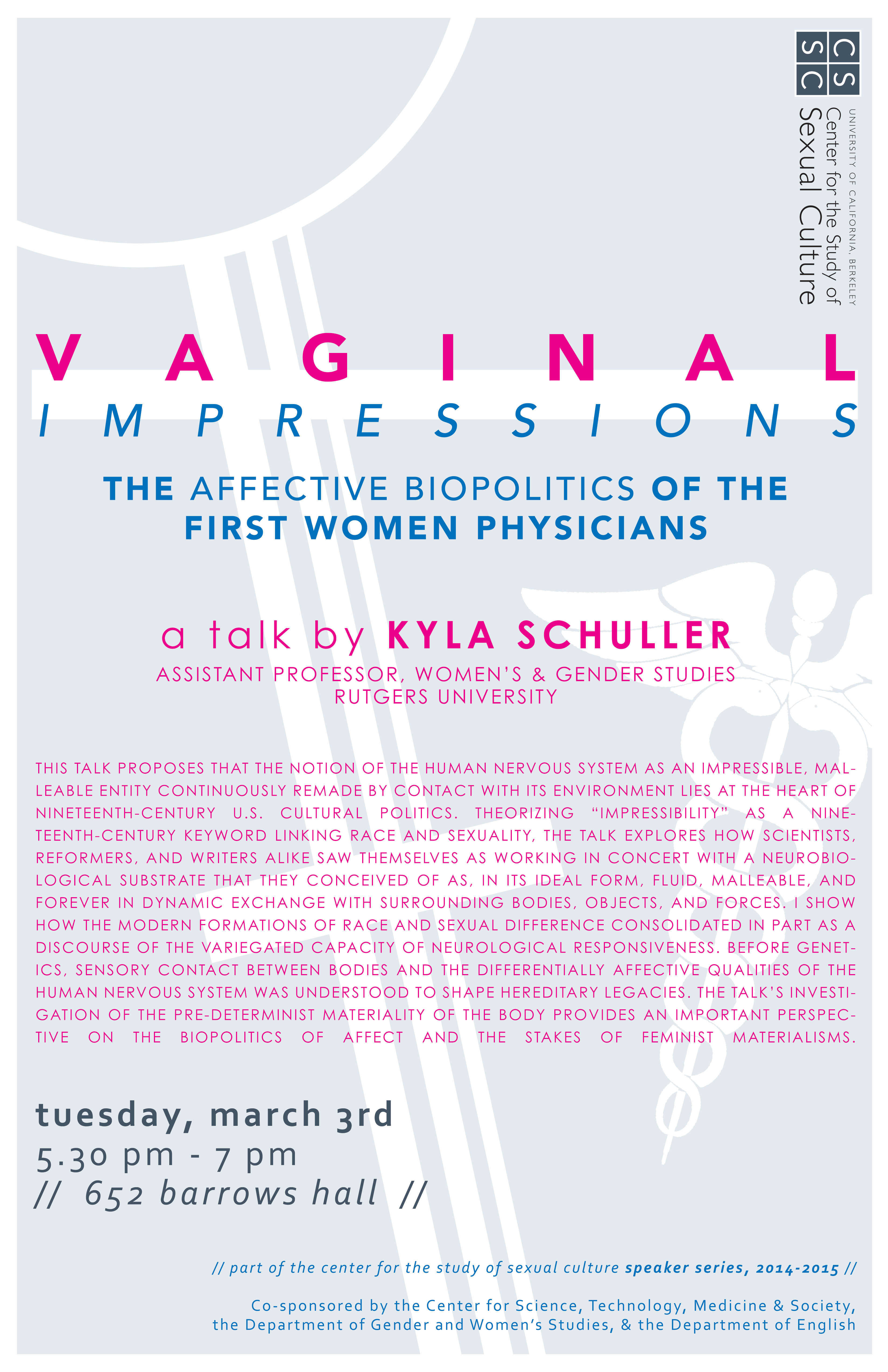
Queer of Color Working Group meeting
Please join the Queer of Color Working Group for a discussion of Nguyen Tan Hoang’s A View from the Bottom: Asian American Masculinity and Sexual Representation. We’ll be discussing the introduction and the second chapter, “Reflections on an Asian Bottom” over drinks and snacks. Come out with us – we’ll be in Barrows 602!
For a PDF of the readings, please e-mail brandon.callender@berkeley.edu
All events are free and open to the public.
Sponsored by the Center for the Study of Sexual Culture.
Queering Agriculture: Food Security in the Nation’s Capital and the Crises of Reproductive American Familism
Attention: New Location–340 Moffitt, off of the Commons
So why queer agriculture? This seems like an odd question but becomes more obvious with research and analysis. This talk highlights vital ways queering and trans-ing ideas and practices of agriculture are necessary for more sustainable, sovereign, and equitable food systems for the creatures and systems involved in systemic reproductions that feed humans and other creatures. Since agriculture is literally the backbone of economics, politics, and “civilized” life as we know it, and the manipulation of reproduction and sexuality are a foundation of agriculture, it is absolutely crucial queer and transgender studies begin to deal more seriously with the subject of agriculture. This talk highlights the normative ways that popular culture, food activism, and government regulations have framed sustainable food systems in the United States. By focusing on popular culture representations and government legislation since 9/11, it will become clearer how the growing popularity of sustainable food is laden with anthroheterocentric assumptions of the “good life” coupled with idealized images and ideas of the American farm, and gender, radicalized and normative standards of health, family, and nation.
Bailey Kier is Ph.D candidate in American Studies and an Administrative Coordinator at the University of Maryland, College Park. Originally from a white working class community in the Cascade Mountains of Western Washington, Kier’s work is heavily influenced from the simultaneous beauty, devastation, poverty, and libertarianism of the logging and mining cultures of the Pacific Northwest. Kier’s dissertation “An American River: A Queer Geography of the Potomac River Basin and Environmentalism in the Nation’s Capitol” examines how mainstream environmentalism has not merely been the benevolent project it’s often represented as, but instead can more accurately be described as the management of populations, resources, and species. Kier’s work has been published in Women and Performance, The Transgender Studies Reader 2, and The New Inquiry. Kier’s research interests include queer ecologies, hydrology, natural history, transgender studies, and studies of science.
Part of the CSSC 2014-15 Speaker Series. This event is free and open to the public.
Disability and Sexuality Studies Working Group
Please join The Disability and Sexuality Studies working group for our first meeting to introduce the group and discuss topics for future meetings*
Refreshments provided
*all events are scent-free
About us
The Disability and Sexuality Studies working group provides a space for inquiry into both disability scholarship and activism. Through connecting readings with current events, screenings, performances, etc., the group explores the intersections of queer theory and disability studies.
Sponsored by the Center for the Study of Sexual Culture.
For more information contact co-coordinators, Gracen Brilmyer and Natalia Duong at ucbdss@gmail.com
Please email: ucbdss@gmail.com with any accessibility questions/needs/concerns
In Treatment: Psychiatry and the Archives of Modern Sexuality
This talk explores the encounter of sexual- and gender-variant people with psychiatry and psychoanalysis in mid-twentieth-century America and examines the role of psychiatric scrutiny and stigma in the making of modern sexuality. Focusing on the archive of St. Elizabeths Hospital, the federal hospital for the mentally ill in Washington, DC, Kunzel reflects on its meaning and challenges to queer history.
RSVP: https://berkeleylaw.wufoo.com/forms/regina-kunzel-talk/
Contact us at spes@law.berkeley.edu if you have any question
This event is sponsored by the LGBTQ Cluster of HIFIS and Center for the Study of Sexual Culture
